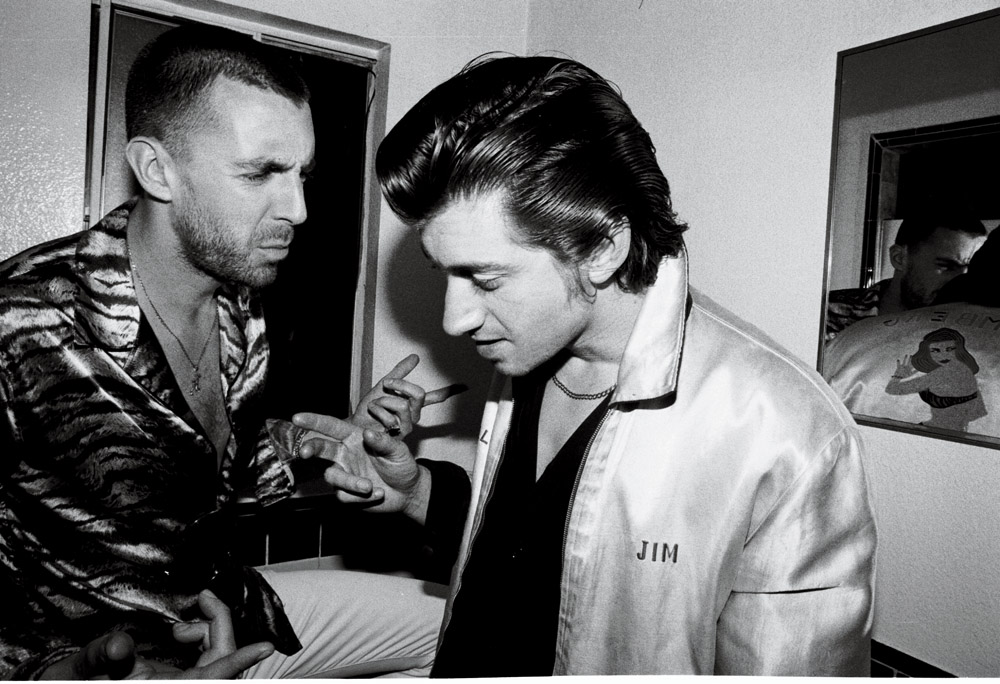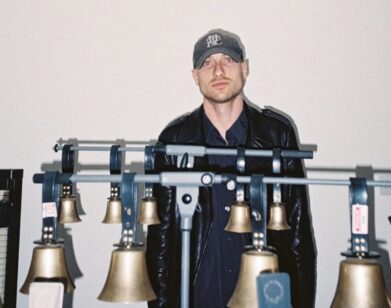The Last Shadow PUPPETS
Say this for Lennon and McCartney, or Plant and Page: they never had their own romantic rock ‘n’ roll portmanteau. But “Milex”—Miles Kane and Alex Turner, for the uninitiated—have just that enviable kind of bromance. Since meeting in 2005—when Turner’s globe-conquering band the Arctic Monkeys brought Kane’s Little Flames on tour—the English musicians have become best friends and firm fixtures in each other’s careers. When Arctic Monkeys headlined the Glastonbury Festival in 2013, there was Kane leaping onstage for the finale; when Kane broke away for a solo career, Turner co-wrote songs on both of his solo albums. The two even moved to Los Angeles in tandem a few years ago. No wonder multiple “Milex” pages have cropped up on Tumblr, breathlessly re-posting the duo’s every embrace and droll quip; there is fan fiction, too, the kind that would make a coal miner blush.
The Last Shadow Puppets, the lads’ spry side band, is further proof of their lasting bond. Despite an eight-year hiatus since the release of their debut album, The Age of the Understatement—an ambitious effort that melded ’60s rock, agile strings, and baroque pop—the group sound tighter than ever on the follow-up, Everything You’ve Come to Expect (Domino). It’s cinematic and polished, with a feisty garage-rock edge; there’s a new bucolic warmth, too, the product of their recording sessions at Rick Rubin’s idyllic Shangri-La studios in Malibu. Though they no longer sport the matching haircuts of their 2008 tour—long, shaggy mop-tops cribbed from Paul Weller’s playbook—they’re still harmonious in every other way. (The band also includes Simian Mobile Disco’s James Ford on drums, Mini Mansions’ Zach Dawes on bass, and string arrangements from Arcade Fire’s Owen Pallett.)
Before the pair head out on an international tour that includes stops at the Coachella and Primavera festivals, they kicked up their heels at Turner’s house Los Angeles to discuss moving to America, outgrowing their enfant terrible twenties, and putting their love up in lights.
STACEY ANDERSON: You both live in Los Angeles now. Who followed whom, or did In-N-Out compel you equally?
ALEX TURNER: That was me first. I moved out here about four years ago, having made an Arctic Monkeys record out here for the second time, with a chap called Joshua Homme, who produced that record. I first started to get to know that place, really, through him. And then we made this record and didn’t want to leave and did leave, and then came back and made another record and still didn’t want to leave, and this time, didn’t leave.
ANDERSON: Miles, what appealed to you about L.A.?
MILES KANE: I think it’s like falling in love with anything. It’s a feeling you get, rather than sort of the boxes that you check. It’s just a feeling, and I couldn’t ignore it anymore and was fortunate enough to be in a position to make it happen. I don’t know if we’ll be here forever. It’s hard to say, but we’re certainly not going anywhere this week.
ANDERSON: Eight years separate your first record together as Last Shadow Puppets and this new one. Why was now the time to make a second album? Did you have any false starts before this?
TURNER: Yeah. There were a couple of times in between when we thought we might try and do another one, but the circumstances dictated otherwise. This is really the first actual break in the weather that we were able to make a dash for it, as it were. I mean, we’d begun to think that we probably wouldn’t do another one. Then it just so happened that everything lined up.
ANDERSON: The album was recorded at Shangri-La studios in Malibu. What about that environment aligned with the record you wanted to make together?
TURNER: Me and Miles, we wrote all the songs, and then the producer, James Ford, who also plays drums on the record, had always wanted to go to the Shangri-La.
KANE: When I first met James Ford about 14 years ago, he always said to me back then that he wanted to go to the Shangri-La, so it was a bit of a dream come true for us and him, as well.
TURNER: I think it had all the knobs that he liked to twiddle.
ANDERSON: Did you have any Zen interactions with Rick Rubin there? Do any sunrise yoga together?
TURNER: No interactions with Rick Rubin. Afraid not, no. I think there is a button on the console where, if you get really stuck, you push it, and a hologram of Rick appears. Luckily, we didn’t find ourselves having to do so.
ANDERSON: It sounds like you didn’t need it. How long have some of these songs been in the works? Were you eager to try anything different together this time around?
TURNER: Yes. The first one we wrote for it was a while ago, about two years ago. I think in the beginning, we were looking so hard for a different thing to try, but it felt stifling to the creativity rather than helpful. When we made the first record, it was a very specific set of reference material. We both started listening to records by Scott Walker, [Serge] Gainsbourg, and David Axelrod and [Ennio] Morricone. Musically, it was kind of like a soundtrack we were enacting or something. It was a very clear idea, the things we were chasing after. This time, in the beginning, I think we were looking for another list of references, or a new tree to bark up, if you will. In doing that, we lost sight of the other component in that first record and what’s making it what it is: just the two of us songwriting together. So with this record, when we kind of stopped searching for a style and just started writing songs, then it began to come to life, and I guess that’s the difference from the first one. That being said, there are different influences musically. There are records we weren’t listening to when we made the last record, but I think it’s less obvious this time. It’s less directly linked to the records that were on our turntables this time.
ANDERSON: Who were you listening to?
TURNER: If I had a dollar. Fuckin’ all sorts of things. Depeche Mode, Tears for Fears …
KANE: Glen Campbell …
TURNER: The Wu-Tang Clan … That’s what I mean; you can’t pinpoint it. What I’m trying to say is, I think if you listen to our first record, you can hear that we were listening to “Jackie,” by Scott Walker, and “The Fly,” by David Axelrod. This time you can still see a lot of that influence there, ’cause that’s the sort of a thing that’s in our DNA at this point—we can’t get away from the twangy guitar, no matter how hard we try. But I feel it’s less of a homage this time.
ANDERSON: I was struck by “Miracle Aligner”; it seems particularly ambitious, glossy yet unpredictable.
TURNER: Yeah, fuckin’ soft edges! We were excited for soft edges this time a little bit. Without going a bit too technical, because I’m not able to, there’s a certain type of chord trick that we hadn’t really used before, that we were excited to use this time. You could describe as slightly more glossy. There’s a shimmery quality to it that can approach the cheese department, and if you can stop just before you get in the door there, that’s kind of the place you want to occupy.
ANDERSON: “Bad Habits” feels like a brash, hectic sort of outlier. How did that one come out? Sounds like a hell of a hangover.
TURNER: That’s a good one! We’ll put that on our T-shirts, Stacey.
KANE: That actually started by Alex playing the bass line, if I remember, [impersonates a bass] bump-ba-ba-bum. When he had that, I started doing some wailing over the top, and then we honed in on those words.
TURNER: That original take of that song is about 40 minutes long, and Miles doesn’t repeat himself once!
KANE: It was really about the editing with that one. I really sort of let fly on that. One day we would like to release that 40-minute version. It’s such an art form and a relief to really let go and do something like that. It’s quite astonishing, really, when you hear it. James helped us edit it down to make it a pop song with, like, a punky edge.
TURNER: We should have just played you that, in this interview. Imagine that.
ANDERSON: The title track mentions “a collar on a diamond dog.” Have you done anything in tribute since Bowie passed? You both seem like fans of his, and you’ve covered him before.
TURNER: We haven’t done anything in tribute, but you know, we’ve always talked about his being an influence. Even when we did the record eight years ago, we did a cover of one of his early songs called “In the Heat of the Morning.” So he’s always been there.
ANDERSON: It can be hard sometimes for friends to buckle down and work together. Is one of you more the taskmaster when it comes to the Last Shadow Puppets?
TURNER: I think we both have our moments. We’re both ready to crack the whip.
ANDERSON: Are there any plans for a third album? Any material ready to go already?
TURNER: Yeah, absolutely. I think we’re too entwined at this point for any severance to be everlasting.
ANDERSON: Anything for your other projects: Arctic Monkeys, Alex, and your solo career, Miles?
KANE: No, nothing’s in the pipeline yet. We’re just enjoying these few months here and not looking for the next event
TURNER: It’s an important point there, I suppose. The thing was, very much in the beginning, when we did it eight years ago, it was for our own enjoyment. We had a couple of weeks off one summer, and we went to France and came out with this record. It kind of runaway-trained itself into a band, and I think it’s important to remember that’s how it started, and try and adopt that attitude toward it as much as possible.
ANDERSON: And you have a tour coming up? Is it different touring with each other versus with your other bands and projects?
KANE: Well, it’s been that long since we toured together doing Puppets, and last time, we didn’t do that many, so we’re doing more gigs now. We’re excited. I mean, it’s been a while for both of us that we’ve have been onstage, so to be on it together is going to be delightful.
ANDERSON: Miles, you turn 30 this month; Alex, you just did. Does that mean anything to you?
KANE: It doesn’t feel weird. I feel more comfortable in my own skin than I did ten years ago, and it’s a nice feeling. I’m still on the path. Still searching for whatever that star is up there, you know what I mean? That never-ending search will never end, I don’t think. I’m just like a big wanderer; you’ve got to keep striving.
ANDERSON: What will you do on your birthday?
KANE: I’m not sure yet; I’m still trying to sort it out. I’ll probably be dancing to some northern soul at some point.
ANDERSON: You’ve been called “rock’s greatest bromance.” How will you defend that title on tour?
TURNER: Probably put it in giant neon lights [Kane laughs] and turn it up a bit. What do you think?
ANDERSON: I really love the last line of the album: “It must be torture when I talk about my dreams.” But isn’t that what bromances are for: sharing your dreams?
KANE: Why, yes, bromances are for sharing your dreams. What a wonderful sentiment.
STACEY ANDERSON IS A NEW YORK-BASED WRITER.







